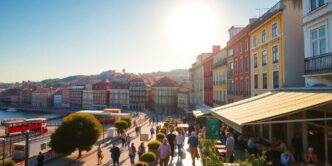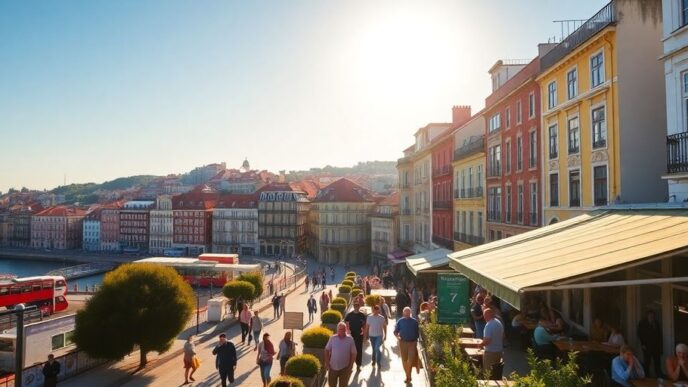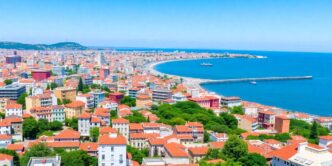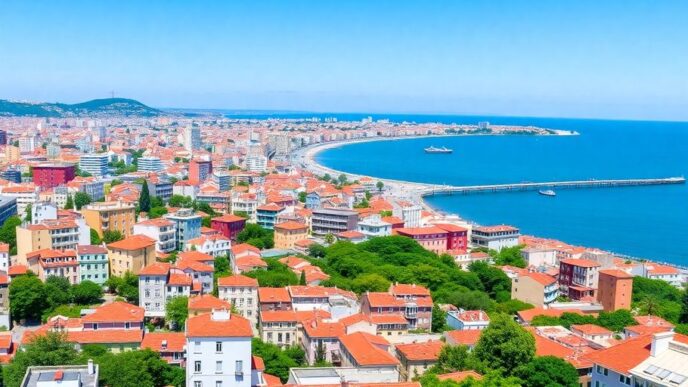Life as a Digital Nomad in Portugal

A Blend of Culture, Connectivity, and Community
Portugal has become a beacon for digital nomads, offering a unique blend of culture, connectivity, and community that appeals to a global audience, including the American in Portugal. The country’s rich history and warm social atmosphere are complemented by a robust network of coworking spaces and language education resources, fostering both productivity and cultural integration.
- Lisbon: Second Home, Heden, Cowork Central
- Porto: Porto i/o, Typewriter, CRU Cowork
- Madeira: Digital Nomad Village, Cowork Funchal
While Portugal is welcoming, understanding Portuguese can significantly enhance a digital nomad’s experience, enabling deeper cultural integration.
The genuine warmth and friendliness of the Portuguese people are renowned, and social connections are deeply valued. Locals often engage in meaningful conversations, whether in a local caf\u00e9 or through a warm greeting from neighbors. This sense of community is not only comforting but also provides a network of support that is invaluable for those adapting to a new lifestyle abroad.
Balancing Work and Leisure in a Mediterranean Climate
The allure of working in Portugal is magnified by its Mediterranean climate, which offers a comfortable environment for both professional endeavors and leisure activities. Digital nomads find that the mild winters and warm, sunny summers create an ideal setting for a balanced lifestyle, where work can be interspersed with outdoor adventures or relaxed café culture.
- Outdoor Activities:
- Coastal Algarve: Surfing, sailing, and beach exploration.
- Madeira’s mountains: Hiking, mountain biking, and paragliding.
The affordable cost of living further enhances this balance, as it allows for the enjoyment of a variety of activities without financial strain. Portugal’s picturesque landscapes and historic cities provide a backdrop that encourages exploration and inspiration, fostering a productive work environment.
The thriving expat and digital nomad community in Portugal contributes to a sense of belonging and makes it easier to navigate the work-leisure dichotomy. This community is often a source of networking opportunities and social gatherings, which are integral to a fulfilling nomadic lifestyle.
Remote workers in Portugal benefit from a lifestyle that is not only conducive to their professional growth but also to their personal well-being. The country’s natural beauty and cultural richness offer endless possibilities for recreation and relaxation, ensuring that the time spent away from the screen is as rewarding as the time spent on it.
Navigating the Digital Nomad Lifestyle with Portugal’s Visa Options
Portugal has become a beacon for digital nomads, offering a unique visa that accommodates the lifestyle of remote workers from around the globe. The Portugal Digital Nomad Visa is designed for those who wish to embrace the Portuguese way of life while engaging in their professional activities from anywhere within the country.
The visa serves as a gateway to the Mediterranean lifestyle, providing legal residency for a temporary period. It’s an attractive option for non-EU citizens who can prove a stable income from remote work. Moreover, the golden visa program presents an alternative path for residency, targeting investors and entrepreneurs who can contribute to the Portuguese economy.
For those considering the move, understanding the eligibility criteria and application process is crucial. Here’s a simplified breakdown:
- Determine if you meet the income requirements.
- Gather necessary documentation, including proof of income and health insurance.
- Submit your application and await processing.
The Portuguese visa landscape is accommodating, yet it requires careful planning and adherence to regulations to ensure a successful transition.
While the digital nomad visa is a national type D visa, it’s important to note that there are other visa types available, each with its own set of requirements and benefits. Exploring these options thoroughly can lead to a more informed decision on which path to residency is most suitable for your circumstances.
The Impact of Digital Nomads on Portugal

Economic and Cultural Contributions to Local Communities
Digital nomads in Portugal have become a significant force, contributing to both the economy and the cultural fabric of local communities. Their presence has led to increased demand for local services and businesses, such as co-working spaces, cafes, and accommodation, providing a boost to the economy. Moreover, they often engage in cultural exchange, participating in local events and festivals, which enriches the community’s cultural diversity.
- Co-working Spaces: A surge in demand has led to the establishment of numerous co-working spaces, fostering networking and collaboration.
- Local Events: Digital nomads often immerse themselves in local culture by participating in festivals and community celebrations.
- Cultural Centers: The thriving arts scene in cultural centers offers opportunities for nomads to explore Portuguese arts and culture.
The integration of digital nomads into Portuguese society has not only stimulated economic growth but also encouraged a vibrant exchange of ideas and traditions, strengthening the social and cultural ties within communities.
Housing and Gentrification: A Double-Edged Sword
The influx of digital nomads into Portugal has brought about significant changes in the housing landscape, particularly in urban hubs like Lisbon and Porto. As these cities have become hotspots for global nomads, the demand for accommodation has surged, leading to a competitive rental market. This competition often results in increased housing costs, which can push local residents out of central areas, a phenomenon known as gentrification.
While the presence of digital nomads can stimulate the economy by bringing in new spending, it also raises concerns about the sustainability of local communities. The transformation of neighborhoods to cater primarily to tourists and temporary residents can lead to the displacement of essential services. Residents may find themselves traveling to other areas for basic needs, as keycutters and supermarkets are replaced by restaurants and bars.
The challenge for Portugal lies in balancing the economic benefits brought by digital nomads with the need to preserve the affordability and authenticity of local communities.
Policymakers have recognized these issues and have begun to intervene. Measures such as the partial closure of the golden visa program, which allowed foreigners to gain residency through real estate purchases, aim to mitigate the impact on the housing market. However, the long-term effects of such schemes and the continued pressure on housing affordability remain to be seen.
Government Strategies and the Future of Nomadism in Portugal
The Portuguese government has been proactive in adapting to the rise of digital nomadism, recognizing the potential benefits that a mobile workforce can bring to the nation. The introduction of the Digital Nomad Visa is a testament to this, offering a legal framework for non-EU/EEA and non-Swiss citizens to live and work in Portugal. This initiative not only caters to the nomadic lifestyle but also aligns with the country’s broader economic goals.
The Digital Nomad Visa, with its clear requirements and process, has made Portugal an even more attractive destination for remote workers.
The visa stipulates certain income requirements, ensuring that applicants have the financial stability to contribute to the local economy without displacing job opportunities for residents. As digital nomad hubs like Lisbon, Madeira, and the Algarve grow in popularity, the government continues to refine its strategies to balance the influx of remote workers with the needs of local communities.
Frequently Asked Questions about the visa reveal the government’s effort to maintain transparency and accessibility for potential applicants. Questions range from the specifics of the application process to the impact on couples and families, reflecting a comprehensive approach to policy-making.
As we look to the future, the sustainability of digital nomadism in Portugal hinges on ongoing dialogue between nomads, local communities, and policymakers. The government’s willingness to evolve its strategies will be crucial in fostering a harmonious environment where both nomads and residents can thrive.
Frequently Asked Questions
So is Portugal good for digital nomads, Yes or No?
Yes, Portugal is an excellent choice for digital nomads, offering a superb climate, a variety of activities, and top-notch coworking spaces. The well-established digital nomad community and the attractive Digital Nomad Visa make Portugal a prime location for work and life.
Why is Lisbon so popular with digital nomads?
Lisbon’s popularity among digital nomads is due to its mild and sunny climate, historic charm, natural beauty, and world-class surf beaches. These factors contribute to a desirable work-life balance, making Lisbon a sought-after destination for remote workers.
What are the impacts of digital nomads on local communities in Portugal?
Digital nomads contribute economically and culturally to local communities in Portugal. However, their presence has also led to concerns about housing prices and gentrification. The government is exploring ways to manage these impacts while capitalising on the benefits of nomadism.













